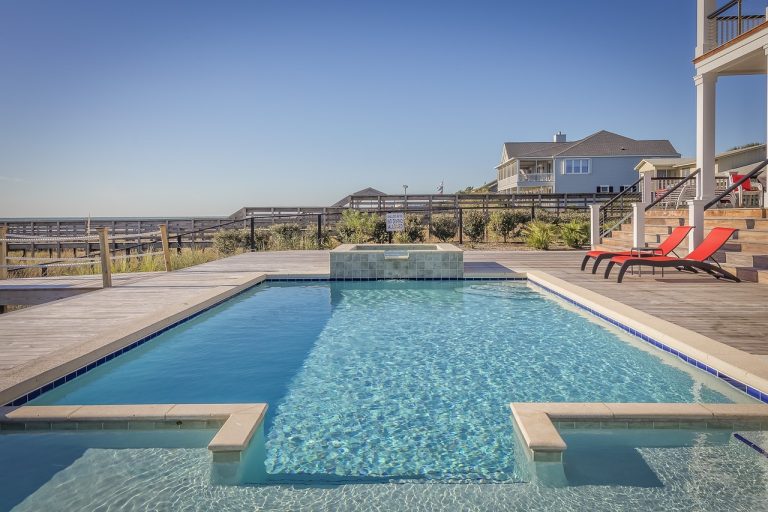Saltwater vs Chlorine Pools: Which is Better for Pool Maintenance in Singapore?

Table of Contents:
- Introduction
- What is a Saltwater Pool?
- What is a Chlorine Pool?
- Comparison Between Saltwater vs Chlorine Pool in terms of Pool Maintenance in Singapore
- Key Summaries of the Pros & Cons
- Which Pool Type is Better for Singapore?
- Legal & Safety Guidelines for Pools in Singapore
- Frequently Asked Questions (FAQs)
- Conclusion
1. Introduction
As swimming pool maintenance specialists with two decades of experience servicing Singapore pools, we understand that choosing between a saltwater pool and a chlorine pool goes beyond personal preference. Your decision impacts ongoing maintenance, costs, and even swimmer comfort.
Whether you are a homeowner, tenant, or facility manager, this guide will help you weigh the key differences to find the pool system that fits your lifestyle, budget, and local climate considerations.
2. What Is a Saltwater Pool?
Think of a saltwater pool as a self-cleaning system that uses dissolved salt to generate chlorine naturally. At the heart of it is a salt chlorine generator (or salt cell), which transforms salt into chlorine via a process called electrolysis.
Unlike traditional pools where you add chlorine manually, a saltwater pool continuously produces a gentle and consistent level of chlorine, keeping the water clean and free from bacteria and algae. This lower chlorine concentration feels softer on the skin, eyes, and hair.
3. What Is a Chlorine Pool?
A chlorine pool is the classic pool setup that relies on adding chlorine chemicals, liquid, tablets, or granules to sanitise the water. Chlorine kills harmful organisms like bacteria and algae, but it requires regular manual dosing and testing to maintain the right levels.
However, if chlorine and pH levels aren’t carefully balanced, chloramines can form, causing the typical “pool smell” and sometimes irritating eyes and skin.
4. Comparing Saltwater vs Chlorine for Pool Maintenance in Singapore
| Maintenance Category | Saltwater Pools | Chlorine Pools |
|---|---|---|
| Chemical Balancing | Requires less frequent chemical adjustments due to the salt-chlorine generator maintaining stable chlorine levels. However, pH levels can rise and may need occasional balancing. | Requires manual monitoring and adjustment to maintain proper balance. Alkalinity and pH must be regularly tested to prevent skin irritation and damage to pool surfaces. |
| Equipment Maintenance | Needs routine inspection and cleaning of the salt-chlorine generator to prevent salt buildup. In Singapore’s humid climate, corrosion of metal parts can occur faster, requiring corrosion-resistant materials. | Involves standard maintenance of the pool filter and pump. No salt-chlorine generator is used, but equipment can still wear down due to chemical exposure. |
| Cleaning Requirements | Requires regular brushing and occasional vacuuming. Salt content may cause scaling, which should be treated with descaling agents. | Needs more frequent cleaning to prevent algae growth, including brushing, vacuuming, and periodic shock treatments to maintain water clarity. |
| Cost of Maintenance | Higher initial cost due to salt-chlorine generator installation. Ongoing expenses are lower due to reduced chemical use, though the generator may need replacement every 3-7 years. | Lower upfront costs, but higher recurring chemical expenses. Regular purchase of chlorine tablets or liquid chlorine adds up over time. |
5. Key Summaries of Pros & Cons
| Saltwater Pools | Chlorine Pools |
|---|---|
| Pros | Pros |
| • Gentler on the skin and eyes due to lower chlorine levels. • Less maintenance with more stable chemical levels. • Lower long-term chemical costs. | • Lower initial installation costs. • Effective at killing bacteria and algae quickly. • Equipment is simpler to maintain. |
| Cons | Cons |
| • Higher initial setup cost due to the salt-chlorine generator. • Requires specialised equipment maintenance. • Potential for metal corrosion in Singapore’s tropical climate. | • Regular handling of chlorine chemicals is necessary. • Can cause skin irritation if not balanced correctly. • Higher long-term costs due to ongoing chemical purchases. |
6. Which Pool Type is Better for Singapore?
When considering the local context, saltwater pools may be more appealing for those looking for reduced chemical exposure and gentler water, which is ideal for families with young children. However, the higher initial setup cost may deter some, especially for smaller residential properties.
Chlorine pools, with their lower upfront costs and established maintenance practices, remain a popular choice. However, facility managers should be prepared for the regular chemical upkeep, especially during Singapore’s rainy season, which can dilute the pool’s chlorine levels more quickly.
7. Legal & Safety Guidelines for Pools in Singapore
In Singapore, both chlorine and saltwater pools are permitted. Chlorine pools follow standard NEA regulations and do not require special approval, as chlorine is the default disinfectant.
Saltwater pools, however, need NEA approval since salt-chlorination is considered an alternative disinfection method. Both pool types must meet the same water quality standards.
If your pool is deeper than 1.5 meters, a BCA permit is required regardless of type. Private residential pools typically don’t need a license unless used for commercial purposes.
7.1 Chemical Safety Tips
Store chlorine and acids separately to prevent chemical reactions.
Use bunded storage for large setups.
Never mix chemicals manually.
Follow all NEA and safety guidelines for handling and storage.
8. Frequently Asked Questions (FAQs)
Q: Are saltwater pools safe for pets?
A: Yes, saltwater pools have lower chlorine levels, making them gentler for pets. However, it’s still advisable to rinse your pet off after swimming.
Q: How often should salt levels be checked in a saltwater pool?
A: Salt levels should be checked every month to ensure they remain within the optimal range for the salt-chlorine generator to function correctly.
Q: Which type of pool is more eco-friendly?
A: Saltwater pools are generally considered more eco-friendly due to reduced chemical usage, but the energy required for the salt-chlorine generator should also be considered.
Q: Can I convert my existing chlorine pool into a saltwater pool?
A: Yes, converting a chlorine pool to a saltwater pool is possible. It involves adding a salt-chlorine generator and making some adjustments to the pool’s plumbing and electrical systems.
9. Conclusion
Choosing between a saltwater and chlorine pool depends on individual preferences, budget, and maintenance willingness. Saltwater pools provide a gentler swimming experience with lower long-term chemical costs, while chlorine pools offer straightforward maintenance with lower initial costs.
Feel free to contact us at Watercraft Engineering for your swimming pool maintenance needs.
